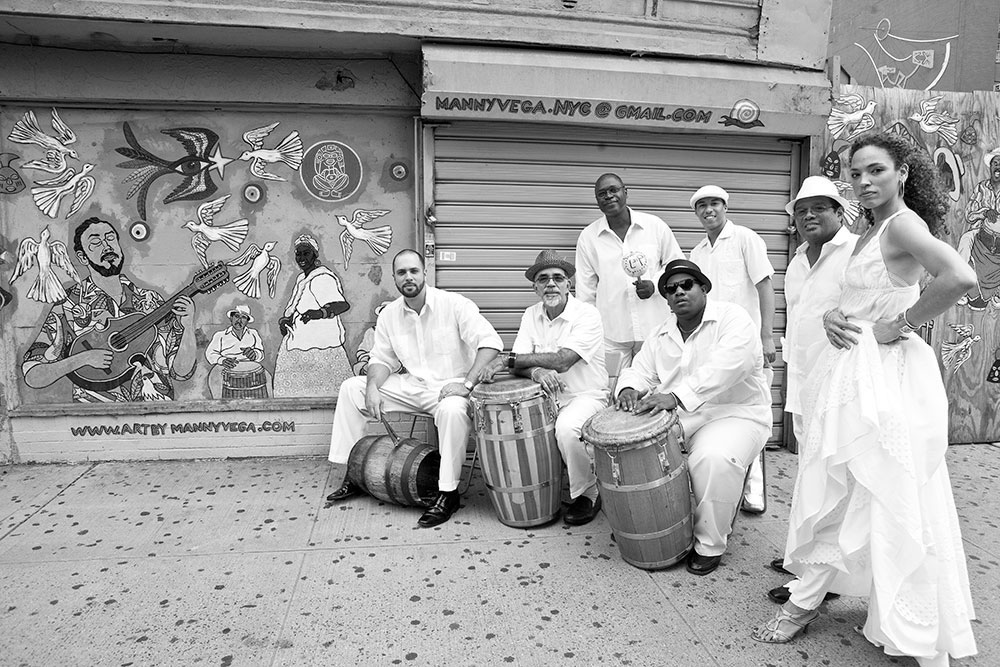Bomba has long been a way for those who play and dance it to forget their troubles. It was true for the island’s slaves who first danced to it centuries ago. It was true after Hurricane Maria too.
MICHEL MARTIN, HOST:
And we couldn’t bring you to Puerto Rico without hearing a little music. Our colleague Adrian Florido is still here with us in studio. And, Adrian, I understand that you have brought us a piece about Bomba.
ADRIAN FLORIDO, BYLINE: Yeah, Puerto Rican Bomba music has always – it’s always been a way for people who dance to it to sort of forget the troubles in their lives. That was true for the island’s African slaves who first started dancing Bomba centuries ago. It’s also been true after Hurricane Maria.
So let me introduce you to Giomar Cruz. He teaches Bomba. And after the hurricane, he organized a little workshop and asked people to write down how they were feeling. Here’s Cruz.
GIOMAR CRUZ: (Speaking in Spanish).
FLORIDO: Cruz says that what stood out were words like anguish, sadness, desperation over having lost so much to the hurricane.
In Bomba music, there is a rhythm to express just those emotions. It’s called Yuba.
(SOUNDBITE OF DRUMMING)
CRUZ: (Speaking in Spanish).
FLORIDO: Our ancestors, our slaves, danced to these rhythms after a long day of work, Cruz says, to shed their sadness.
(SOUNDBITE OF DRUMMING AND SINGING)
CRUZ: (Singing in Spanish).
FLORIDO: He demonstrates Yuba’s basic step, left foot to the side while bringing his right fist to the chest, then his right foot to the side, left fist to his chest. And then, a verse.
(SOUNDBITE OF DRUMMING AND SINGING)
CRUZ: (Singing in Spanish).
FLORIDO: I’m looking for a tree to give me shade, he sings, because this tree I’ve got doesn’t shield me from the sun.
At his workshop after the hurricane, Cruz says people felt such relief dancing to Yuba that they cried. Bomba and other traditional music helped people cope.
Marcos Penaloza Pica is a musician from Loiza, a coastal community of windswept beaches and palm trees, home to descendants of the island’s slaves, its cradle of black culture.
MARCOS PENALOZA PICA: (Speaking in Spanish).
FLORIDO: We had no water, electricity, TV, radio, phone, nothing, Penaloza says, but we had our drums and our hands and our feet, and that’s all we’ve ever needed to dance Bomba.
(SOUNDBITE OF SONG, “CANDELA”)
BUYA: (Singing in Spanish).
FLORIDO: In most drum dances, the dancer follows the drummer’s lead, but Bomba is different. The drummer is responding to the dancer’s movements – the flick of a wrist, bouncing shoulders, gyrating hips. The dancer and the drummer are in conversation.
(SOUNDBITE OF SONG, “CANDELA”)
BUYA: (Singing in Spanish).
FLORIDO: Marcos Penaloza Pica defines Bomba simply as the expression of freedom.
PENALOZA PICA: (Singing in Spanish).
FLORIDO: I’m living in sadness, he sings. Every day brings more suffering. Oh, God, what’ll become of me? If I couldn’t dance Bomba, I’d rather die.
Here in Loiza, there is a cultural center that teaches Bomba. Maricruz Rivera Clemente is its director, and she says that shortly after the hurricane, two women, the center’s oldest participants, showed up to ask if the classes would go on.
MARICRUZ RIVERA CLEMENTE: (Speaking in Spanish).
FLORIDO: They’d suffered so much damage to their homes, Rivera says, but they still came, and that said a lot. The hurricane ripped holes in the center’s roof, but Rivera resumed classes the following week. Sure, when it rained, they got wet. But in those days when so many people were fleeing the island, Rivera saw Bomba – culture, identity, that emotional connection – as among the few things that might convince people to stay.
RIVERA: (Speaking in Spanish).
FLORIDO: Our ancestors survived much worse, Rivera says she told people who considered leaving. We have tools – we have culture to get us through this. Come on. Let’s dance a little.
(SOUNDBITE OF SONG, “BORICUA SOY”)
LERO: (Singing in Spanish).
FLORIDO: About 10 miles from Loiza, in the capital, San Juan, Alfredo Emerson has hosted a night of Bomba and Plena music most Mondays for the last two years. It’s always been a popular gathering, but in the days after Maria, attendance surged, especially among young people.
ALFREDO EMERSON: (Speaking in Spanish).
FLORIDO: They’d find out through social media, Emerson says, and they’d say, hey, there’s nothing else to do. Let’s go there. And they liked it, and they’re still coming.
(SOUNDBITE OF MUSIC)
UNIDENTIFIED GROUP: (Singing in Spanish).
FLORIDO: It’s all over, this artist sings. Like the passing wind, you took everything from me, and my love has died. As they play, one young person after another steps up, bows to the lead drummer in a show of respect and begins to dance.
(SOUNDBITE OF MUSIC)
UNIDENTIFIED GROUP: (Singing in Spanish).
MARTIN: Adrian, thank you so much.
FLORIDO: Of course.
Originally posted by NPR


